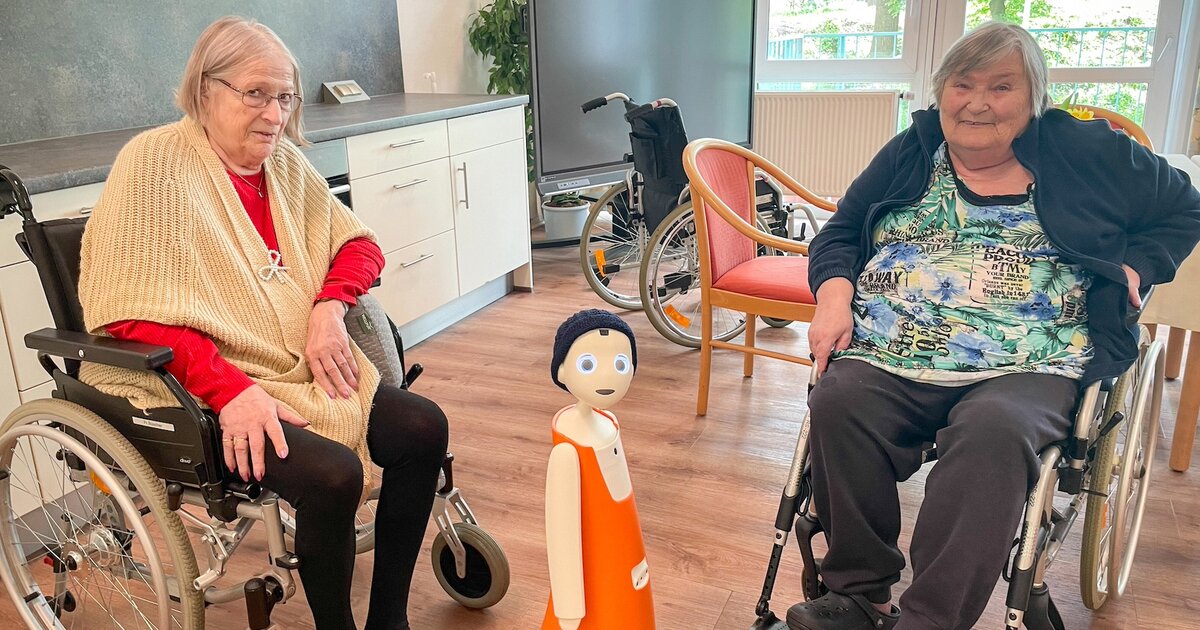
How robot Ricky reaches his limits in the nursing home
“Uschi Büscher is a very nice lady and I’ve talked to her often,” says Ricky, about one meter tall, with a knitted hat on his plastic head. His voice sounds a little choppy. He stands between Uschi Büscher and Erika Diekmann’s two wheelchairs in the lounge of the Johanniter senior care home in Hanover-Ricklingen and looks at the two older women with large, somewhat empty eyes.
“Yes, that’s right, we have that too,” replies 81-year-old Uschi Büscher and gives him a friendly wink over the rim of her glasses. The white-haired lady speaks slowly, loudly and clearly and smiles somewhat indulgently at the little robot. “We talked about Sweden. It was an interesting conversation.”
The topic of care robots is in its infancy
Ricky is a “social robot” from the Munich company “Navel robotics” and has been being tested in a pilot project at the Johanniterstift since December – he is supposed to talk to the old ladies and gentlemen. The project is accompanied by a doctoral thesis at the Hannover Medical School. She explores how AI in retirement homes can benefit residents.
“The fact is that robotic systems in care are still in their infancy,” says medical ethicist Robert Ranisch, who is organizing a citizens’ conference on “robotics in care” at the University of Potsdam this weekend. “The reality is that they fail just to drive over the edge of a carpet. Or that they simply collect dust because no one can service them or the WiFi doesn’t work again.”
Real closeness?
According to Ranisch, there are basically three types of system: a robot that can take on physical work, such as transporting water bottles. One that is used for monitoring, for example to indicate a fall or to remind people to take tablets. And one that can simulate social interaction. This is also the area in which there is the greatest concern that “real closeness will be automated away,” says the researcher.
Real closeness – how is Ricky received by the residents of the retirement home in Hanover? “I would have thought that the enthusiasm would die down a bit when the appeal of the new thing was no longer there. But our seniors are still impressed and rave about his googly eyes,” says home manager Tim Geikowski. Public relations officer Silke Steinemann adds: “They see him as an ally – according to the motto: He talks to me.”
“As stubborn as a child”
Even if Ricky doesn’t always understand everything straight away. “And what are you talking to Erika about today?” supervisor Miriam Rebel asks the little robot on this spring afternoon. Be silent. “That’s the demonstration effect,” says home resident Erika Diekmann, 78 years old, with a gray pageboy and light eyes. “Ricky, hello, Ricky?” she asks patiently. It helps what usually helps when you have a technical problem with computers: turning it off and turning it on again. “He’s as stubborn as a child,” says Diekmann.
These are experiences that many people outside of retirement homes also have with Alexa or Siri: mumbles or more demanding or colloquial questions or statements in spoken language are not always understood by the AI.
Always polite and correct
Accordingly, you have to ask Ricky several questions several times. The residents and carers are still patiently responding to him and adapting to his “thinking” – even though it should actually be the other way around. The home staff, Rebel and Steinemann, also say that people with dementia and those with hearing impairments have a harder time coping with it.
What Uschi Büscher, who worked at the airport before retiring, and Erika Diekmann, who worked as a dressmaker, particularly like is that he is so polite and expresses himself so correctly. If you ask him to, he will also recite a poem – something funny by Heinz Erhardt, for example – or something thought-provoking by Rilke.
Get emotionally carried away
He also tells jokes when necessary. “What’s a cookie under a tree? A shady spot.” When everyone laughs, Ricky also lets out a high, tinny laugh.
“People can also quickly become emotionally carried away by machines. This is not much different with a robot than with television. There, too, people immerse themselves in illusory worlds. As is so often the case, the degree is crucial here,” says researcher Ranisch, who generally works in… Dealing with robots calls for more calm. Illusionary worlds are already common in retirement homes: Dementia sufferers are deliberately exposed to a fictitious scenario through pseudo-bus stops or photo wallpaper with trees that simulate a forest.
No human appearance
It is clear that no robot can hold a candle to humans when it comes to physical contact, affection, compassion or creativity, explained the director of the Munich “Institute of Robotics and Machine Intelligence”, Sami Haddadin, in an interview with the health insurance company AOK.
Robots shouldn’t look too human either: according to the study, this causes an uncomfortable feeling and they would be rejected. “A robot in care can look a little more human than R2D2 from Star Wars – for example with eyes,” says the expert.
No replacement for people
For the two ladies Büscher and Diekmann, the blue-eyed Ricky is above all “the break filler” and offers a bit of variety. “It would be a shame if he were no longer there,” they say. Replace a conversation or a relationship with a person? “No, he can’t do that,” both say. “But perhaps we don’t know him enough yet,” says Uschi Büscher with a wink.
The vast majority of the 96 residents have agreed to Ricky visiting them and talking to them. For around three seniors, the relatives were against the care robot being used for their relative, says manager Geikowski. A 97-year-old was also skeptical herself, says public relations officer Steinemann. “‘It’s scary to me that he can remember, I don’t want him to talk to me again,'” she said.
Learning to walk planned
Anyone who wants to communicate with Ricky must first fill out a sheet that authorizes the data storage: The robot saves everything you tell it under the name you give it. This makes it possible for him to remember and reconnect with old conversations. This can also lead to confusion during a conversation if, for example, he has spoken to two different Renates.
“He can’t walk yet, but he should learn,” says Geikowski. The aim is that at some point he will be able to ride his bike independently through the monastery’s rooms and, for example, look for residents who have forgotten to come to dinner. This should soon work through facial scans.
“A real heartbreaker.”
“We will need more technology in care. That has nothing to do with technical fascination. The challenge of five million people in need of care is real,” says researcher Ranisch.
Home manager Geikowski believes that social robots like Ricky will be in use everywhere in 15 years. “You can provide employees with time resources. Conversations are important, but take up a lot of time.” In any case, the robot is very popular with its residents. “A real heartbreaker.”

Ethel Purdy – Medical Blogger & Pharmacist
Bridging the world of wellness and science, Ethel Purdy is a professional voice in healthcare with a passion for sharing knowledge. At 36, she stands at the confluence of medical expertise and the written word, holding a pharmacy degree acquired under the rigorous education systems of Germany and Estonia.
Her pursuit of medicine was fueled by a desire to understand the intricacies of human health and to contribute to the community’s understanding of it. Transitioning seamlessly into the realm of blogging, Ethel has found a platform to demystify complex medical concepts for the everyday reader.
Ethel’s commitment to the world of medicine extends beyond her professional life into a personal commitment to health and wellness. Her hobbies reflect this dedication, often involving research on the latest medical advances, participating in wellness communities, and exploring the vast and varied dimensions of health.
Join Ethel as she distills her pharmaceutical knowledge into accessible wisdom, fostering an environment where science meets lifestyle and everyone is invited to learn. Whether you’re looking for insights into the latest health trends or trustworthy medical advice, Ethel’s blog is your gateway to the nexus of healthcare and daily living.



